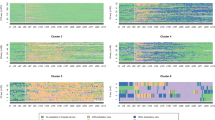Abstract
This is a study of two types of case management:case management (CM) which provided the servicecoordination functions, and Intensive Case Management(ICM) which consisted of both the coordination function and the provision of direct support to theclient. Using secondary data on public clients,characteristics of mental health service use wereanalyzed for 80 ICM and 84 CM clients. The ICM clientshad significantly fewer episodes per patient and less inpatientdays per year than the CM clients. These findingssuggest that direct support services make a significantdifference in reducing annual hospital care.
Similar content being viewed by others
REFERENCES
Anthony, W. A., Cohen, M., Farkas, M., & Cohen, B. F. (1988). Clinical care update: The chronically mentally ill: Case management—more than a response to a dysfunctional system. Community Mental Health Journal, 24(3), 219–228.
Axelrod, S., & Wetzler, S. (1989). Factors associated with better compliance with psychiatric aftercare. Hospital and Community Psychiatry, 40(4), 397–401.
Bogin, D.C., Anish, S.S., Taub, H.A., and Kline, G.E. (1984). The effects of a referral coordination on compliance with psychiatric discharge plan. Hospital and Community Psychiatry, 35(7), 702–706.
Borland, A., McRae, J., & Lycan, C. (1989). Outcomes of five years of continuous intensive case management. Hospital and community Psychiatry, 40(4), 369–376.
Bond, G. R., Witheridge, T. F., Dincin, J., Wasmer, D., Webb, J., & De Graaf-Kaser, R. (1990). Assertive community treatment for frequent users of psychiatric hospitals in a large city: A controlled study. American Journal of Community Psychology, 18(6), 865–891.
Curtis, J. L., Millman, E, J., Struening, E., & D'Ercole, A. (1992). Effect of case management on rehospitalization and utilization of ambulatory care services. Hospital and Community Psychiatry, 43(9), 895–899.
Deci, P.A., Santos, A.B., Hiott, D.W., Schoenwald, S., & Dias, J.K. (1995). Dissemination of assertive community treatment programs. Psychiatric Services, 46(7), 676–668.
Dincin, J., Wasmer, D., Witheridge, T. F., Sobeck, L., Cook, J., & Razzano, L. (1993). Impact of assertive community treatment on the use of state hospital inpatient bed-days. Hospital and Community Psychiatry, 44(9), 833–838.
Franklin, J. L., Solovitz, B., Mason, M., Clemons, J. R., & Miller, G. E. (1987). An evaluation of case management. American Journal of Public Health, 77(6), 674–678.
Goering, P. N., Wasylenki, D. A., Farkas, M., Lancee, W. J., & Ballantyne, R. (1988). What difference does case management make? Hospital and Community Psychiatry, 39(3), 272–276.
Goldman, H.H., Gattozzi, A.A., & Taube, C.A. (1981). Defining and counting the chronically mentally ill. Hospital and Community Psychiatry, 32(1), 21–27.
Kanter, J. (1989). Clinical case management: Definition, principles, components. Hospital and Community Psychiatry, 40(4), 361–368.
Macias, C., Kinney, R., Farley, O. W., Jackson, R., & Vos, B. (1994). The role of case management within a community support system: Partnership with psychosocial rehabilitation. Community Mental Health Journal, 30(4), 323–339.
McGrew, J.H., Bond, G.R., Dietzen, L., & Salyers, M. (1994). Measuring the fidelity of implementation of a mental health program model. Journal of Consultation and Clinical Psychology, 62(4), 670–678.
Philadelphia Office of Mental Health and Mental Retardation (1990). Annual Update; 1990–1992. Philadelphia: Author.
Philadelphia Office of Mental Health and Mental Retardation (1992). Diversion Services Directory. Philadelphia: Author.
Quinlivan, R., Hough, R., Crowell, A., Beach, C., Hofster, R., & Kenworthy, K. (1995). Service utilization and costs of care for severely mentally ill clients in an intensive case management program. Psychiatric Services, 46(4), 365–371.
Rothbard, A.B., Richman, E., & Hadley, T.R. (in press). “Unbundling” of state hospital services in the community: The Philadelphia state hospital story. Administration and Policy in Mental Health.
Rothbard, A.B., Schinnar, A.P., Hadley, T.R., & Rovi, J.I. (1990). Integration of mental health data on hospital and community services. Administration and Policy in Mental Health, 18(2), 91–99.
Sands, R. G., & Cnaan, R. A. (1994). Two modes of case management: Assessing their impact. Community Mental Health Journal, 30(5), 441–457.
Solomon, P. (1992). The efficacy of case management services for severely mentally disabled clients. Community Mental Health Journal, 28(3), 163–180.
Solomon, P.L., Gordon, B.H., & Davis, J.M. (1984). Community services to discharged psychiatric patients. Springfield, IL: Charles C. Thomas.
Stein, L. I., & Test, M. A. (1980). Alternative to mental hospital treatment: I. Conceptual model, treatment program, and clinical evaluation. Archives General Psychiatry, 37, 392–397.
Stein, L. I., Diamond, R. J. (1985). A program for difficult-to-treat patients. In L. I. Stein & M. A. Test (Eds.), The training in community living model: A decade of experience: New directions for mental health services No. 26 (pp. 29–39). San Francisco: Jossey-Bass.
Sytema, S., Micciolo, R., & Tansella, M. (1996). Service utilization by schizophrenic patients in Groningen and South-Verona: an event-history analysis. Psychological Medicine, 26, 109–119.
Tessler, R.C., Willis, G., & Gubman, G.D. (1986). Defining and measuring continuity of care. Psychosocial Rehabilitation Journal, 10(1), 27–36.
Test, M. A., Knoedler, W. H., & Allness, D. J. (1985). The long-term treatment of young schizophrenics in a community support program. In L. I. Stein & M. A. Test (Eds.), The training in community living model: A decade of experience: New directions for mental health services No. 26 (pp. 17–27). San Francisco: Jossey-Bass.
Witheridge, T. F. (1989). The assertive community treatment worker: An emerging role and its implications for professional training. Hospital and Community Psychiatry, 40(6), 620–624.
Rights and permissions
About this article
Cite this article
Kuno, E., Rothbard, A.B. & Sands, R.G. Service Components of Case Management Which Reduce Inpatient Care Use for Persons with Serious Mental Illness. Community Ment Health J 35, 153–167 (1999). https://doi.org/10.1023/A:1018772714977
Issue Date:
DOI: https://doi.org/10.1023/A:1018772714977




